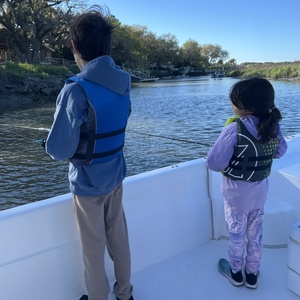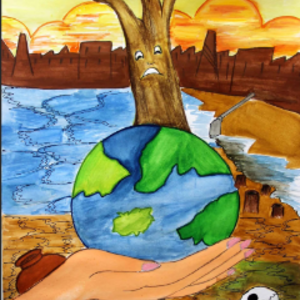-
 Elinor Yu 4/27/2024 10:10 AM
Elinor Yu 4/27/2024 10:10 AM
Darcy Hoag
POINTS TOTAL
- 0 TODAY
- 0 THIS WEEK
- 1,067 TOTAL
participant impact
-
UP TO1.0Carbon FootprintCalculated
-
UP TO1.0energy auditconducted
-
UP TO1.0water footprintcalculated
-
UP TO1.0advocacy actioncompleted
-
UP TO30minutesspent outdoors
-
UP TO421minutesspent learning
Darcy's actions
Freshwater + Oceans
Smart Seafood Choices
We need to support healthy seafood populations. I will spend 10 minutes learning about sustainable seafood choices, commit to making better seafood choices for a healthier ocean, and share what I learned on the feed.
Climate + Air
Online Energy Audit
Energy use and waste is often invisible. I will complete an online energy audit of my home, office, or dorm room and identify my next steps for saving energy.
Freshwater + Oceans
Understand My Water Footprint
Each of us has a water footprint, directly linked to our daily activities as well as the water required in the production of things we use each day. Understanding our water use is important for a healthy planet. I will calculate my water footprint and look for a few ways I can reduce consumption or waste, then share what I learned on the feed.
Biodiversity + Wildlife
Save the Bees
Bees are vital to ecosystems. To help save the bees, I will learn which local flowers provide nectar and plant them in my backyard or in a pot on my balcony.
Climate + Air
Calculate My Carbon Impact
Carbon emissions can show up in many surprising ways in our life. I will calculate the carbon emissions associated with my household and consider how lifestyle changes could reduce the carbon footprint and impacts on the environment.
Biodiversity + Wildlife
Learn about Native Species
The world is full of unique species. I will spend 5 minutes each day learning what the native plants and wildlife are in my region.
Climate + Air
Low Carbon Diet
Carbon is emitted into the atmosphere in a variety of ways, including through the foods we eat and food we waste. I will learn about low carbon foods and replace higher carbon foods with them in my diet.
Biodiversity + Wildlife
Biodiversity and Me
I will spend at least 2 minutes each day researching what biodiversity is, how biodiversity positively impacts our world, and how the loss of biodiversity harms it. I will share what I learn on the feed.
Climate + Air
Declutter My Home Without the Landfill
Each day, I will learn about responsible ways to dispose of items and de-clutter, clean, donate, repurpose or recycle unneeded items in my home to make sure that what I get rid of doesn't go into the landfill.
Land + Forests
Explore My Area
When we explore natural spaces around us, our connections with them change. I will spend 15 minutes exploring a new area around my neighborhood, office, or campus (e.g., park, water body, nearby trail, community garden, green space, etc.).
Biodiversity + Wildlife
Beauty and Personal Products
Beauty and personal products can create a lot of waste. I will spend 15 minutes learning about the beauty and body products I use to see if they are refillable or recyclable. If not, I will reach out to the manufacturer to advocate for those options.
Biodiversity + Wildlife
Grow Local
I will research and plant a garden filled with native fruits, vegetables, and flowers to nurture local wildlife and ecosystems. I will find nearby nurseries that offer plants native to my area.
Freshwater + Oceans
Reduce Pollutants in Cleaning
Understanding cleaning product ingredients and their effect on water and biodiversity is helpful to our consumer choices. I will spend 15 minutes learning about how cleaning products affect our water and try making my own cleaning products to reduce pollutants.
Participant Feed
-
REFLECTION QUESTIONFreshwater + OceansWhat did you learn about ingredients in our cleaning products and how they impact water and biodiversity? Did you try making your own cleaning products? If so, how did it go?
 Darcy Hoag 4/27/2024 9:43 AMyou can do a lot with vinegar as a cleaning agent, without causing harm to the environment. and it's pretty cheap
Darcy Hoag 4/27/2024 9:43 AMyou can do a lot with vinegar as a cleaning agent, without causing harm to the environment. and it's pretty cheap -
REFLECTION QUESTIONClimate + AirWhere did you do an energy audit (work, home, school, other) and what did you learn?
 Darcy Hoag 4/26/2024 11:36 AMthings got inspected when a heat pump was installed to replace an old gas/electric furnace that was very inefficent
Darcy Hoag 4/26/2024 11:36 AMthings got inspected when a heat pump was installed to replace an old gas/electric furnace that was very inefficent -
REFLECTION QUESTIONFreshwater + OceansWhat did you learn about your water footprint and what are you going to do to reduce and be aware of the water you use?
 Darcy Hoag 4/26/2024 9:28 AMI had no idea about virtual water use and how high that can be. I never thought about water use to produce the goods I use.
Darcy Hoag 4/26/2024 9:28 AMI had no idea about virtual water use and how high that can be. I never thought about water use to produce the goods I use. -
 Darcy Hoag 4/26/2024 9:19 AM
Darcy Hoag 4/26/2024 9:19 AM-
 Tijana Bunjevacki 4/26/2024 2:18 PM
Tijana Bunjevacki 4/26/2024 2:18 PM -
 Yashika Velayutham 4/26/2024 10:04 AM
Yashika Velayutham 4/26/2024 10:04 AM -
 Vasundara Abhishek 4/26/2024 9:51 AM
Vasundara Abhishek 4/26/2024 9:51 AM
-
-
REFLECTION QUESTIONClimate + AirHow did it feel to intentionally declutter with putting things into the landfill? What did you learn along the way about yourself and our consumer and waste systems?
 Darcy Hoag 4/26/2024 9:18 AMI found my neighborhood "free" group and have posted some things I no longer need/use. I just had to leave it on my porch for someone who wanted it to come pick up
Darcy Hoag 4/26/2024 9:18 AMI found my neighborhood "free" group and have posted some things I no longer need/use. I just had to leave it on my porch for someone who wanted it to come pick up-
 Tijana Bunjevacki 4/26/2024 2:18 PM
Tijana Bunjevacki 4/26/2024 2:18 PM
-
-
REFLECTION QUESTIONClimate + AirWhich high carbon foods will you eat less of, and what are some low carbon options you'll choose instead?
 Darcy Hoag 4/23/2024 1:28 PMI planted a bunch of seeds so that I can have some fresh veggies without having to go to the store in a few months
Darcy Hoag 4/23/2024 1:28 PMI planted a bunch of seeds so that I can have some fresh veggies without having to go to the store in a few months -
REFLECTION QUESTIONBiodiversity + WildlifeHow did it feel to plant something native in your area to support local wildlife and biodiversity? What did you plant? Please consider adding a photo.
 Darcy Hoag 4/15/2024 2:20 PMI planted a couple of columbines this weekend to attract hummingbirds and bees to my yard
Darcy Hoag 4/15/2024 2:20 PMI planted a couple of columbines this weekend to attract hummingbirds and bees to my yard-
 Tijana Bunjevacki 4/23/2024 2:22 PM
Tijana Bunjevacki 4/23/2024 2:22 PM -
 Mary Frigo 4/16/2024 7:00 AM
Mary Frigo 4/16/2024 7:00 AM
-
-
REFLECTION QUESTIONBiodiversity + WildlifeWhat did you learn about a native plant or animal species in your region?
 Darcy Hoag 4/12/2024 8:46 AMI looked into what native plants attract hummingbirds and will visit a nursery this weekend to see what I can find to plant
Darcy Hoag 4/12/2024 8:46 AMI looked into what native plants attract hummingbirds and will visit a nursery this weekend to see what I can find to plant -
REFLECTION QUESTIONLand + ForestsWhere did you go for your walk or hike in nature? What were the benefits of doing so?
 Darcy Hoag 4/06/2024 8:31 AMI took my dog on a walk through a park I didn't even know was 1 street away from my house, kind of tucked away
Darcy Hoag 4/06/2024 8:31 AMI took my dog on a walk through a park I didn't even know was 1 street away from my house, kind of tucked away-
 Sathish Mohanasundaram 4/06/2024 8:46 AM
Sathish Mohanasundaram 4/06/2024 8:46 AM -
 Anna Marie Angeles 4/06/2024 8:42 AMWalking near nature - with lots of trees is fulfilling. It improves my mood, self-esteem, and relaxation.
Anna Marie Angeles 4/06/2024 8:42 AMWalking near nature - with lots of trees is fulfilling. It improves my mood, self-esteem, and relaxation.
Frequent exposure to nature reduces my anxiety and depression while promoting a sense of wellbeing and fulfillment.
-
-
REFLECTION QUESTIONClimate + AirWhere in your life do you emit the most carbon? What change are you willing to make in your daily life to reduce this output?
 Darcy Hoag 4/05/2024 11:42 AMI found that I do better than average but there are still more things I can do to offset my carbon footprint.
Darcy Hoag 4/05/2024 11:42 AMI found that I do better than average but there are still more things I can do to offset my carbon footprint.-
 Arjun Kumar 4/05/2024 11:45 AM
Arjun Kumar 4/05/2024 11:45 AM
-
